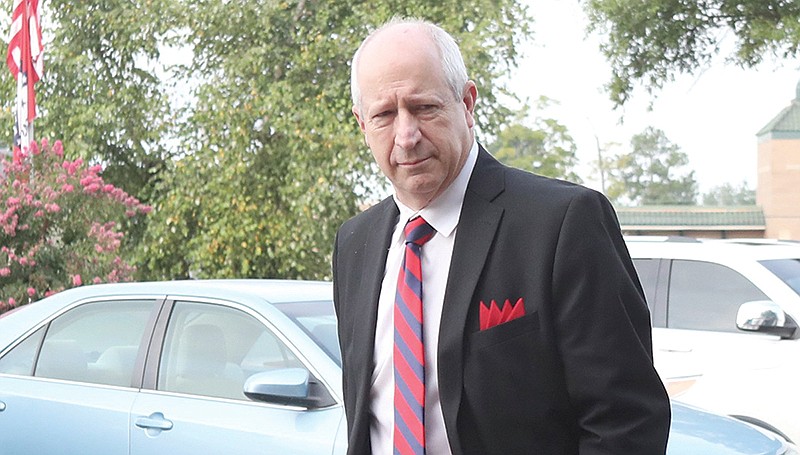LITTLE ROCK -- The Arkansas Supreme Court on Thursday overturned a lower court ruling against a former state lawmaker Mickey Gates in his dispute over how much in back taxes he owes the state.
The 6-1 order reverses a ruling granting summary judgment to the state Department of Finance and Administration against Mickey Gates, who was expelled from the state House of Representatives in 2019, and his wife. The case will return to Garland County Circuit Court, where Tyler DeWitt, lead attorney representing the Gateses, expects it will go to trial.
"It was the correct result," said DeWitt of the high court ruling during an interview Thursday. "The Gateses never had a meaningful opportunity to challenge the tax assessment by DFA."
The Finance and Administration Department does not comment on litigation it is involved in, said Scott Hardin, a spokesperson for the agency in an emailed statement Thursday.
Gates was arrested in 2018 on charges of failing to pay taxes or file a tax return over a six-year period. The Arkansas State Police claimed the Republican representative from Hot Springs owed more than $250,000 in back taxes, penalties and interest.
In the summer of 2019, Gates pleaded no contest to one count of failing to file a state income tax return or pay taxes.
The plea allows Gates to avoid a finding of guilt if he satisfies the conditions of his six-year probation, which include paying $74,789 in taxes, penalties and interest owed for the 2012, 2013 and 2014 tax years and filing returns for the 2015, 2016 and 2017 tax years.
The state House of Representatives voted 88-4 in October of 2019 to expel Gates after both Republicans and Democrats called on him to step down.
After auditing the returns Gates was required to provide as part of his plea, state officials initially determined he and his wife owed $50,519 plus penalties and interest. The Gateses disputed that finding, contending the Finance and Administration Department incorrectly taxed legitimate business expenses associated with their corporation, Stonebridge Collection Inc., Justice Rhonda Wood wrote in the majority opinion.
The Gateses eventually admitted that some deducted expenses listed on the profit-and-loss statement of their business were personal expenses.
The Finance and Administration Department, however, could not define what constituted a legitimate business expense when asked to explain why it had excluded expenses that seemed to be business-related. State officials also sent the Gateses several tax-assessment letters in 2020 showing differing tax liability amounts. Between four written communications, the total liability varied from $21,677 up to $54,187, according to the high court ruling.
After reaching an impasse, the Gateses sued the department.
Special Judge Gary Arnold granted summary judgment for the department, ruling state officials had met the burden needed to prove Gates had earned income subject to state tax. Woods wrote that it is undisputed the Gateses had some taxable income based on their filed returns but there is still a dispute over the amounts of their taxable income for 2015, 2016 and 2017.
"After reviewing the Gateses' income tax returns and 1099s, DFA computed net taxable incomes that were greater than what the Gateses had reported," wrote Wood. "DFA could be correct, but its figures throughout the audit were moving targets, and it never revealed its math to the Gateses, the circuit court, or this court on appeal."
Justice Robin Wynne dissented with the majority opinion, contending the Gateses are responsible for proving they are entitled to additional tax deductions beyond those allowed by state officials. Wynne also pointed to documentation that he said showed how the department calculated the amount of net taxable income.

